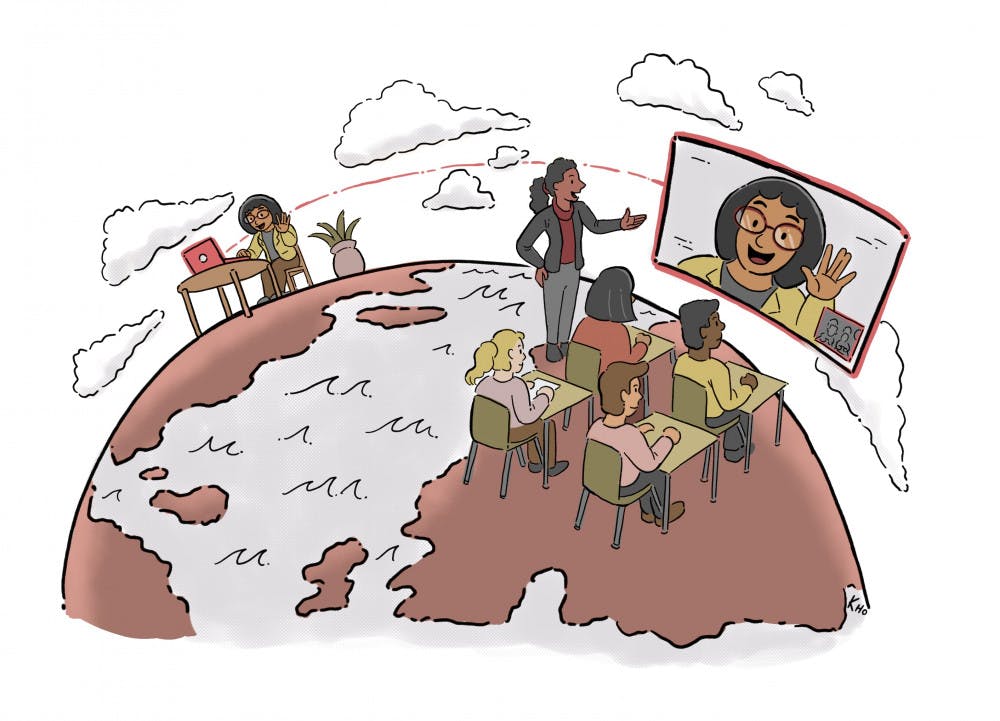Throughout the pandemic, remote learning has allowed professors to incorporate a more diverse set of guest lecturers into their syllabi. As Brown continues its fourth semester of remote learning, The Herald spoke with professors about their experiences hosting lectures over Zoom and their plans for incorporating guest speakers in the future as the University transitions back to in-person instruction.
“I immediately saw an opportunity in Zoom and how, on the one hand, students were certainly losing out on some aspects of in-person teaching, that sort of warmth and bonding that can happen in a class,” said Karan Mahajan, assistant professor of literary arts. “But I also realized that if we were going to be stuck in this virtual world, we could also draw in people from other cities and from other parts of the world as well.”
In the fall 2020 semester, Mahajan taught a literature seminar LITR 1231K: “Innovations in Indian Literature.” For him, Zoom became a tool to connect students with a variety of Indian writers who, in other years, would not have been able to travel to Providence.
“It’s a treat especially when you’re studying international literature to be able to actually engage with the people behind the work,” he said. “I think a lot of the foreignness of the subject starts dissolving. And you realize that literature is a conversation that is being had all over the world, not just in a classroom at Brown.”
Felipe Martínez-Pinzón, assistant professor of Hispanic studies, also found remote learning useful in facilitating conversations between students and speakers who, prior to the pandemic, would have been harder to connect with, namely international authors and speakers older in age. Particularly notable, he said, was being able to Juan Manuel Echavarría, a prominent Latin American artist and filmmaker from Colombia, to his course HISP 1371L: “Take My Breath Away: A Cultural History of Air in Modern Latin America's Imagination and Literature.”
“He was too old to come to Brown, and with COVID it was practically impossible to bring him here, but he’s very tech-savvy, even more than I am. He’s in his late seventies,” Martínez-Pinzón said. “Without Zoom and without the COVID experience, it would have been very difficult to have Juan Manuel on board.”
Martínez-Pinzón also found that, at times, the remote nature of these lectures made them even more impactful, particularly when author Mary Louise Pratt visited to discuss her essay “Airways.”
The essay is “about the politics of breath in the United States during COVID, but it’s also about the Black Lives Matter movement. She talks about who can breathe and who can’t. She does a whole beautiful and heartbreaking and impactful explanation of how air is unevenly distributed in different communities,” he said.
“To have her do that through Zoom gave it another layer. Being in that format of not being able to breathe with her, breathe in the same room, gave the discussion and reading of the essay an extra added value. We are still in the pandemic, and talking about a text in that format sort of just created another rhythm and made it seem more real even though it’s more virtual,” he said. “It’s a paradox.”
Robert Azar, visiting associate professor of urban studies, said that prior to the pandemic, his courses typically included a variety of guest lectures. For Azar, Zoom became a critical tool in maintaining this aspect of the curriculum.
“I always invite guests who are engaged in one aspect or another of urban planning in Providence or Rhode Island, people that I work with and that I know,” he said. As Providence’s deputy planning director, Azar’s classes offer the unique experience of hearing from individuals working in urban planning directly.
“After everything shut down we kept the class going, and I already had a guest scheduled,” he said. “Once we got up and running with Zoom, I just did it that way, and I’ve done it ever since.”
While Azar is eager to return to more in-person instruction, he believes that Zoom will remain a useful way to bring in guest speakers moving forward.
“For guest speakers, it’s probably less important to have them in the classroom, just because it tends to be more of a presentation with Q and A,” he said. “I think Zoom lends itself well to that format, as opposed to a round table discussion or a collaboration,” which would be more practical through in-person instruction.
Given the positive experience of inviting guest lecturers throughout the pandemic, Mahajan intends to continue the practice in later semesters. In the fall 2021 semester, he plans to teach the course LITR 1200: “Writers on Writing,” where, traditionally, a different author is invited to class every week. Because the course will be taught entirely online, he plans to invite exclusively international writers.
“I’m going to try to only invite fiction writers who live in other countries who we would never be able to have,” he explained. “We will definitely have an author and a translator coming from India. We potentially have someone who’s an English writer who lives in Prague who’s going to come. I’m going to invite a South African writer, so there’s going to be a range of people.”
“In a normal semester, it would have been impossible to have four speakers in one class,” Martínez-Pinzón agreed, excited by the possibility of more remote speakers moving forward. “It’s extraordinary in that sense.”

ADVERTISEMENT




